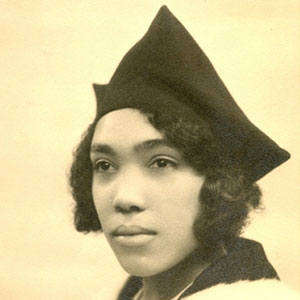Merze Tate
Life Dates: b. February 6, 1905 – d. June 27, 1996
Full Name: Vernie Merze Tate
Birthplace: Blanchard, MI
Tags: Education, Government Service, International Relations, Philanthropy
The remarkable Merze Tate became a college dean and professor at well-known renowned universities, a world traveler, an international reporter, and an international relations advisor to General Dwight D. Eisenhower, all while defying tremendous odds during the Jim Crow era.
Tate was a grandchild of the first African-American settlers in Mecosta County. Born in Blanchard, Michigan in 1905, a very small community about 60 miles northeast of Grand Rapids near Mt. Pleasant, she longed to see the world outside the pine trees and dirt roads which surrounded her.
When she graduated from high school and applied to the University of Michigan, Ms. Tate was turned down because of the color of her skin. However, she was invited to attend Western Teachers College (later renamed Western Michigan University) by the president, Dr. Dwight B. Waldo, and in 1927 accomplished a first by becoming the first African American to graduate from that institution.
In 1935, she returned to college and became the first African American to earn a graduate degree from Oxford University in England. Her dissertation and further scholarly interest on disarmament, including her Fulbright fellowship in India, led to her appointment as an advisor to General Eisenhower on international relations.
In 1941, she made history again when she became the first African American female to earn a PhD in political science from Harvard University. In 1970, Ms. Tate yet again accomplished another first by becoming the first African American to receive the Distinguished Alumni Award from Western Michigan University.
Tate was a college professor at several institutions, including Barber Scotia College, Bennett College, and Morgan State College. Tate taught the longest at Howard University, where she worked from 1942 to 1977. During this time. she spoke five languages, traveled the world twice, was an international reporter for Baltimore’s Afro American Newspaper, and worked as a photographer, filmmaker and researcher for the U.S. State Department, all while being a college professor.
Tate died in 1996 at the age of 91, having never married nor leaving behind any children. However, her legacy lives on. She has left millions to institutes of higher learning who looked beyond her race and gender to provide her with a stellar education and to inspire her to impact the world in many areas for generations to come.
Sources and Related Links:
Text from this biography is adapted from a Rapidian article by former Board Trustee Sharon A. Hanks.
GGRWHC Follow-Up on Merze Tate Presentation
Merze Tate’s Michigan Women’s Hall of Fame Biography
Western Michigan University: Who Was Dr. Merze Tate?

